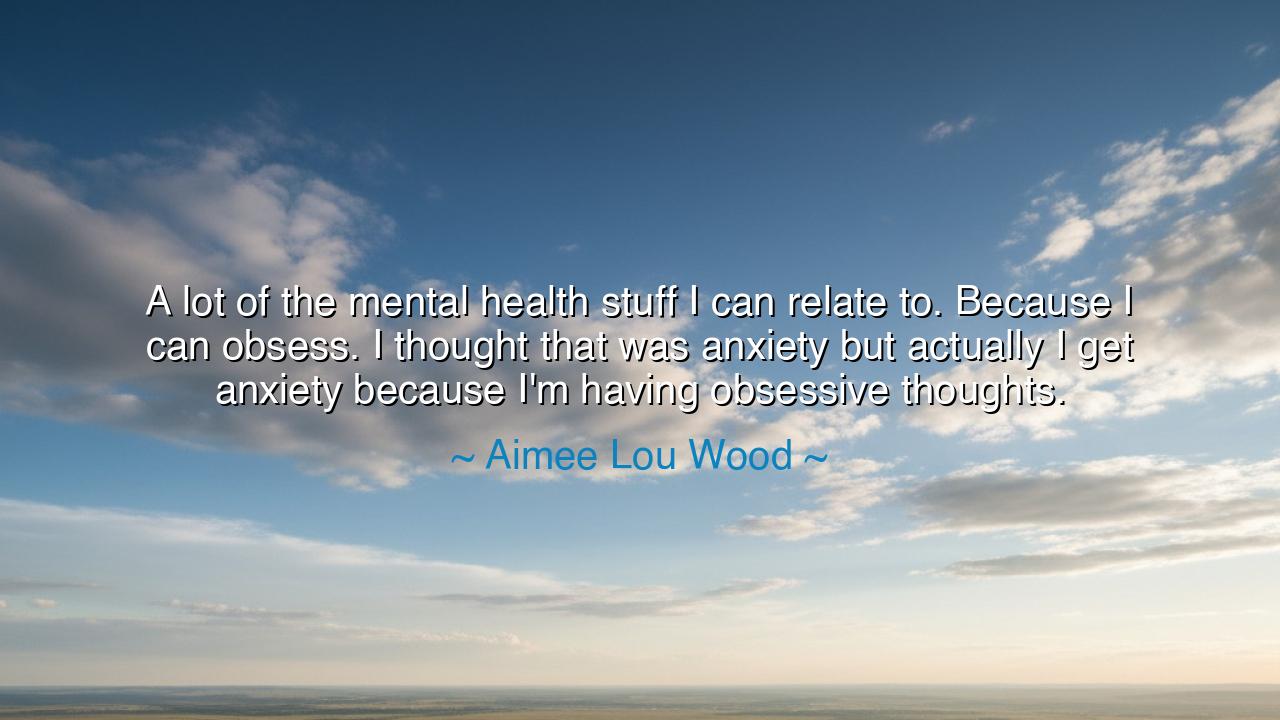
A lot of the mental health stuff I can relate to. Because I can
A lot of the mental health stuff I can relate to. Because I can obsess. I thought that was anxiety but actually I get anxiety because I'm having obsessive thoughts.






There are moments in the quiet chambers of the mind when thought itself becomes both friend and tormentor. In such a moment, Aimee Lou Wood spoke truth drawn from the depths of her own reflection: “A lot of the mental health stuff I can relate to. Because I can obsess. I thought that was anxiety but actually I get anxiety because I'm having obsessive thoughts.” This confession, simple in form yet profound in meaning, unveils the hidden cycle that binds many souls—the storm between thought and feeling, between the mind that will not rest and the heart that trembles beneath its command.
Her words reveal a sacred distinction. Many believe that anxiety is born from fear alone, but Wood speaks of a deeper root—the obsession, the unyielding mind that clings to every doubt, replaying each shadow until it grows monstrous. It is not the body that trembles first, but the mind that traps itself in endless circles. Like a hawk circling above a barren field, the obsessive thought cannot find rest, and so the anxious heart beats faster, trying to flee from its own reflection. In this, Wood’s insight is both modern and ancient, for it echoes the teachings of philosophers who once warned that the greatest battle is not with others, but within one’s own thoughts.
The ancients knew this struggle well. Marcus Aurelius, the philosopher-emperor, wrote in his meditations: “You have power over your mind—not outside events. Realize this, and you will find strength.” Yet even he, ruler of empires, confessed to wrestling with thoughts that would not yield. His wisdom reminds us that the mind, ungoverned, becomes a tyrant. So too did Aimee Lou Wood, through her own lived truth, come to understand that anxiety is often the echo of unmastered thought, a reaction not to the world outside, but to the noise within.
There is tragedy and beauty in this revelation. The tragedy lies in how many suffer without understanding the source of their torment. The beauty lies in the moment of awareness—the light breaking through the fog of confusion. When Wood recognized that her obsession gave birth to anxiety, she uncovered the map to healing: for one cannot calm the waves until one knows where the storm begins. It is not weakness to feel anxiety; it is a sign that the mind has wandered too long without rest, and now calls out for stillness.
Let us remember, too, that obsession is not always the enemy. It is the same force that drives the artist to creation, the thinker to discovery, the lover to devotion. But as with fire, it must be tended wisely. Unchecked obsession burns; disciplined focus illuminates. The one who learns to turn obsessive energy into purposeful attention finds not madness, but mastery. Just as the alchemist transforms base metal into gold, so must we transform our restless thoughts into understanding.
We see this lesson lived in the story of Vincent van Gogh, whose mind was both his muse and his torment. His letters reveal endless rumination, ceaseless thought that spiraled into despair. Yet through those very storms, he painted light—stars that whirl with motion, fields that shimmer with hope. His life teaches that awareness alone is not enough; one must also create from the chaos. To acknowledge one’s obsessive mind is the first step toward freeing it; to use it as fuel for meaning is the second.
Therefore, the wisdom of Aimee Lou Wood’s words is this: know the difference between what begins the fire and what feeds it. The anxious heart does not arise from nothing; it grows from thoughts left unexamined, fears left unnamed. When we learn to see thought as thought—not as truth, not as prophecy—we begin to reclaim our peace. Each person must become the guardian of their own mind, discerning which thoughts deserve their attention and which must be allowed to pass like drifting clouds.
So I say unto all who hear: when your mind begins to spin its endless wheels, do not curse it, but listen. Ask not, “Why am I afraid?” but “What am I thinking?” Sit beside your thoughts as one might sit beside a troubled child—patient, kind, but firm. Breathe deeply. Anchor yourself in the present moment. For the storm will always come, but the wise learn to stand in its center with calm heart and clear eyes. Thus, as Aimee Lou Wood has shown, the key to peace lies not in silencing the mind, but in understanding its voice—and choosing, at last, which thoughts are worthy of being heard.






AAdministratorAdministrator
Welcome, honored guests. Please leave a comment, we will respond soon